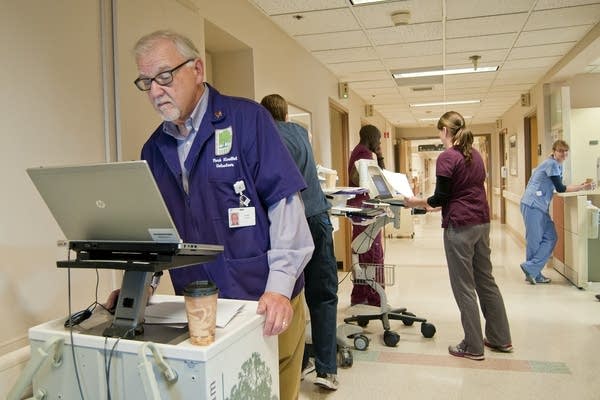Hospitals finding ways to fight delirium in elderly patients

Go Deeper.
Create an account or log in to save stories.
Like this?
Thanks for liking this story! We have added it to a list of your favorite stories.
Lora Krall says delirium made her mother's final days a nightmare. The 73-year-old didn't recognize her daughter or husband.
The delirium took hold while Krall's mother, Harriet, was in the hospital, being treated for pneumonia.
"She would see things," Krall recalled, like "mice in the room. The walls were moving. She would a lot of times just grab at things and there wasn't anything there."
Delirium is a common and a terrifying experience for elderly hospital patients and their loved ones. But the hallucinations, paranoia and other symptoms can be avoided. More than two dozen Minnesota hospitals have new programs to help.
Turn Up Your Support
MPR News helps you turn down the noise and build shared understanding. Turn up your support for this public resource and keep trusted journalism accessible to all.
Delirium stems from a chemical imbalance in the brain brought on by a medical problem. Any number of factors can cause the disorientation — medication, surgery, severe pain, infection, low oxygen or prolonged lack of sleep. All of those are common experiences during a hospital stay.
Twelve years later, Krall still gets emotional, saying she will never forget the panic in her mom's eyes.
"The memory that I have of her is complete confusion," she said.
Krall, a retired nurse who lives in Winona, said she doesn't know whether her mother's delirium could have been prevented. Her mom was gravely ill and had many other medical problems.
But research shows that many hospital delirium cases can be avoided. Recognizing symptoms early and helping patients reorient themselves to their surroundings help keep the confusion at bay.

In Minnesota, 25 hospitals have beefed up their delirium prevention programs in the past few years.
Most programs tap nurses to identify early signs of the condition. But at Methodist Hospital in St. Louis Park, 150 specially trained volunteers make daily delirium rounds.
Ev Weinstein, for example, has been a volunteer for two years with a program called HELP, short for Hospital Elder Life Program. Each week Weinstein spends four hours visiting older patients. As he asks questions — inquiring how a patient slept last night, or what day of the week it is — his easygoing manner sounds casual. But each question has a medical purpose.
Disrupted sleep is a big factor in delirium. So is dehydration and losing track of time. People with lengthy hospitalizations can lose track of the seasons, the day of the week and even whether it's day or night — especially in the winter.
Even poor vision or hearing can contribute to delirium. So Methodist volunteers carry wipes to clean eyeglasses, and they urge patients to use their hearing aids while in the hospital.

Paula Duncan coordinates the HELP program at Park Nicollet Health Services. She oversees three delirium-check shifts each day and organizes the volunteers' schedules.
It's a lot of hands-on patient work. But Duncan said the volunteers have helped Methodist cut delirium rates by half in most specialty units.
"It's highly preventable, if we do these very simple activities with our patients," she said.
In addition to deploying volunteers, the hospital has also changed some of its nursing protocols.
Geriatric medicine specialist Dr. Olufemi Banjoko said that if a patient doesn't need intense overnight monitoring, nurses are urged not to interrupt the patient's normal sleep routine.

"Why can't the patient sleep in later today?" Banjoko asked. "Why can't they stay up later if they choose to? And you know, do we really need to check a blood pressure in the middle of the night, even though the routine calls for it?"
Preventing delirium can save money by keeping people out of nursing homes. But Lora Krall's experience shows that the effort can also save memories.
"My mom was a very active little lady," she recalled. "She was very busy in the kitchen. It's very hard, even 12 years later, for me to recall really pleasant memories of my mom and what she used to do, because that [delirium] was so vivid, and so not like her."
Krall said that when she was still a nurse she would try to keep family members from seeing a loved one in delirium. The memory, she said, can be difficult to live with.


